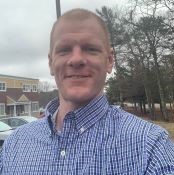06.10.20
Clearing the Way for Recovery
 Riverside Community Care has united many of the services needed for a successful recovery from substance use into a single program: Connect2Recovery. Recently we spoke with Michael Leslie, Recovery Support Navigator, who has a key role in guiding clients through the process of achieving and maintaining a healthy lifestyle. Here are some of his thoughts.
Riverside Community Care has united many of the services needed for a successful recovery from substance use into a single program: Connect2Recovery. Recently we spoke with Michael Leslie, Recovery Support Navigator, who has a key role in guiding clients through the process of achieving and maintaining a healthy lifestyle. Here are some of his thoughts.
Q. Can you tell us what is different about Connect2Recovery, from your perspective as someone in recovery who is guiding others along the same path?
A. The Riverside program is one of the few in the state that combines all of the elements that a person needs to get their life back. A Recovery Coach, someone who has gone through this process themselves, will mentor the person, providing the encouragement and the motivation to help them do this. A Recovery Support Navigator is also available to help with other parts of life – whether it’s housing or financial or even legal issues. Often, especially early in recovery, people can become overwhelmed with those basic needs instead of being able to focus on getting well. We can help connect them to the specific recovery community that works for them, or to housing advocates if they’re just coming into sobriety and need a place to live — we do whatever we can to help them stabilize their situation in life, so recovery can happen.
Q. Can you give any specifics on how Connect2Recovery determines what is important and necessary for each person?
A. A key piece of starting down the path is our Recovery Wellness Plan. This document outlines the client’s goals – it could be one or several, but it’s “person-centered” because it’s about them, their life, their priorities. So in that first phone conversation, we find out what we can do to help them in all areas of life. As part of their recovery, some people want to repair family relationships, or maybe find a good job, or go back to school. What’s important is that we don’t just file that plan away. It’s the map toward a healthy and full life for that individual, and it guides us as we go along.
Q. During the COVID-19 emergency many health services, including most Riverside programs, have transitioned to online or phone. How has this affected the work that you do with clients?
A. This is really an unsafe time, and it’s particularly unstable for people who are new to recovery or who want to be doing that work. The lack of social contact, the boredom, the loss of purpose – these lead to higher levels of anxiety and depression, and all are triggers for people who may be thinking about using. We make sure that we are consistently reaching out to the client to make sure they are well, because connection for people in recovery is huge. And being able to at least see a person’s face and to look them in the eye using Zoom or telehealth can make a big difference. But then there are always those times when someone just needs to take a walk, and we respect all of the health advice out there and take care to meet up safely. Again, it’s all about what the client is most comfortable with.
Q. What are some of the things you personally try to convey about this program, and recovery in general, when you’re talking with a client?
A. I always want to end on a positive note. I let people know that even if they’re just speaking with me on the phone, that means they’re working on recovery. They could be angry or upset right now, but look – you’re not using; you’re doing something better. And I remind people that what’s happening now won’t last. If we can just push through the depression and anxiety, we will get to a better place.
And what I’d like to say to anyone out there who may be struggling and ready to reach out – we’re right here to help. We are a single stop for all the services you need. Not only is there no wait for Connect2Recovery services, but we can also get you in to see Riverside therapists and psychiatrists with little to no wait. The only requirement for this program is a diagnosis of substance use disorder and MassHealth coverage, and then you have access to all services with no charge. You do not have to do this alone.
For more information about Riverside’s Connect2Recovery program, visit https://www.riversidecc.org/adult-services/substance-use-recovery/.
